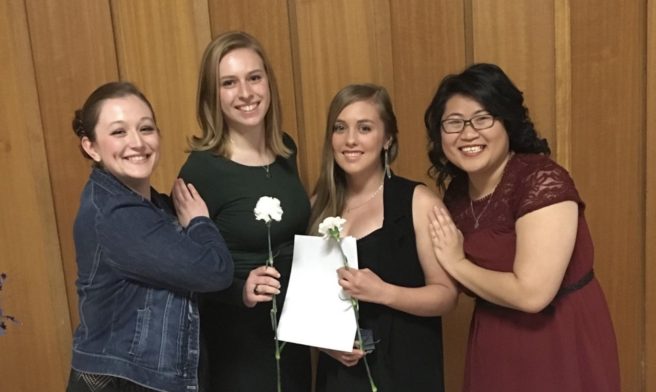Living in a Women’s House Made Me a Better Feminist

Posted by Dené Dryden
March 30, 2018

During my first two years attending Kansas State University, I chose to live in a small, all-female residence hall called Smurthwaite Scholarship/Leadership House. To describe what it is, I often say that it’s the perfect balance between a sorority community and a typical residence hall. But my experience in this small community of women is much more than logistically perfect. I have been immersed in a supportive, educated, uplifting, engaging, and friendly family.
Now that I plan to move off campus for the rest of my time at K-State, I have reflected on the past two years. Smurthwaite has been foundational to my college experience so far, and it has shaped me not only as a student and a friend, but as a feminist.
One factor that has helped me become a better feminist is exposure to other women’s experiences and ideas. The house’s community is diverse, and there is no pressure to conform to a certain appearance or lifestyle. We are all different in regards to ethnicity, country of origin, religious affiliations, areas of study (albeit biochemistry is very popular), and our moral belief systems.
My opportunity to connect with women who are very different than me—while sharing a common appreciation for scholarship and service—has resulted in deep friendships and great critical conversations. Some of my housemates share opinions that contrast my own, and despite our differences with how we perceive gun rights, abortion, religion, marriage, etcetera, we have cultivated a mutual respect for each other and support each other in our academic and personal endeavors.
Learning from those other points of view has made me a better feminist. I can see firsthand how other women approach obstacles in their lives and how they rationalize the situation. My housemate might make a personal decision that I would not, but that’s okay; as long is it her free choice, it makes her happy, and it does no harm, then I will support her.
I have also been engaged with our house’s diversity committee, and our big goal is to implement more diversity-specific language in our house constitution and bylaws. Since I hold a lot of societal privileges, I have learned when to speak up for communities not represented in the room and when to listen to others when they are speaking from their own experience that I do not have. Knowing when you do and don’t have something to contribute to the conversation is an important skill to learn. This is pertinent when you have the opportunity to learn from someone whose life experiences are different than yours, particularly if they are disadvantaged in our society (for example, if they are a person of color, LGBTQ+, disabled, etc.).
Learning from the lived experiences of other women has taught me how to empathize with others to a degree that I don’t have to agree with their perspective or opinions to have a good, respectful relationship with them. As long as their ideas aren’t harmful to me or another group of people, we’re good.
I would tell every college student to find a community of people—be it in your dorm, your workplace, in a class, or in a club—where you can share your ideas freely and have healthy debate and exploration of ideas. I have done this in Smurthwaite, and those critical conversations within my friendships have strengthened me as a feminist, a student, a friend, a romantic partner, a person.
Leave a Reply
You must be logged in to post a comment.

